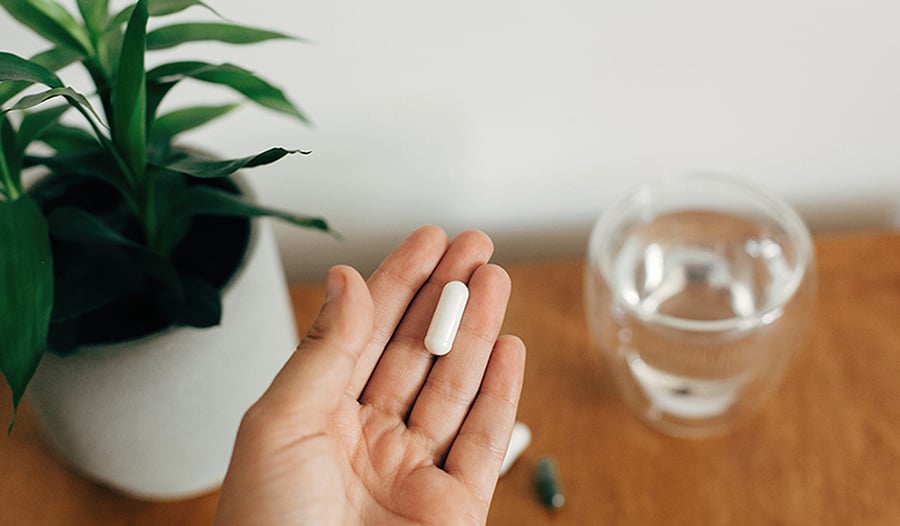How To Design A Daily Supplement Regimen

There are a vast number of supplements available. Choosing what to supplement and when can be overwhelming. If you are drowning in options and need guidance, I am here to help.
Before Supplementing Evaluate Your Overall Wellness
Dietary supplements are exactly that—they are meant to augment an already intact wellness plan. Gaps in your wellness will likely not be remedied with a pill, powder, or tablet. However, in terms of optimizing your health and wellness, supplements may help bring you to the next level.
First, ensure you have maximized high-impact wellness pillars to optimize your goals.
Examples of key aspects of your wellness to work on before adding in supplements include:
- Sleep
- Nutrition
- Fitness
- Recovery
If these pillars are optimized, then, by all means, pursue supplementation.
Read Supplement Labels
In general, you need to understand what it is you are about to put in your body. To learn about ingredients, read labels. Many supplements may advertise that they contain one ingredient, when in fact they contain many. Supplements are not regulated in the same manner as food, therefore they can contain additives and chemicals that may be harmful to you.
As a rule of thumb, if you need a degree in biochemistry to understand an ingredient, that supplement is probably not for you. But, if you decide to take aloe vera juice for heartburn, for example, that’s probably okay because it is natural and contains only one ingredient.
In general, avoid ingredients like sodium benzoate or monosodium glutamate. And make sure to research the effects different additives may have on your body. Exercise simplicity. The more natural, the better.
Be Wary of Supplement Interactions
It is also important to note that many supplements can interact with each other, or with other medications you may be taking. These interactions may alter the potency of drugs and elevate your risk of toxicity and adverse effects.
In my world, liver-related drug injury is a common reason for office and hospital stays. Most of the time, people did not evaluate what they were supplementing with and the potential effects on their bodies. Please consult the medical literature, and work with your healthcare provider when considering supplementation.
Be Clear On Your Goals For Supplementation
Ask yourself why you are taking a supplement in the first place. What effects are you aiming for and what are your goals? If you want to take a pill to get six-pack abs, well, that’s not likely. However, if you want to support your immunity naturally with agaricus blazei, that’s a more realistic goal.
Once you identify your goals, evaluate any scientific data that supports the claims the supplement is making. Are these data on that exact supplement? Is the research of quality (blinded and compared with a placebo)? Was the research funded by an independent group or the company itself?
In science, we call all of these potential study influences biases. Biases, added by funding, lack of quality, or confounders (additive factors at play) can all lessen the validity of study findings. With this in mind, the desired effect or safety of the substance you are about to use may not be what you get. Be aware of these biases in your products. Use a keen eye when you do your research and do not fall victim to a headline—the devil is in the details.
5 Essential Supplements for Your Daily Regimen
There are many supplements out there that claim many things. As a Western-trained doctor, I am aware of such information, yet see benefit in my clinical and wellness consulting practices for certain supplements. Almost everyone can benefit from adding these nutrients to a daily regimen.
1. Protein Powder
Whey protein powder is a valuable supplement for individuals in the fitness world. Protein supplementation is practiced by most performance athletes and athletically inclined persons. Personally, and in my clinical practice, I recommend supplementing with a simple whey protein. It is delicious, affordable, and free of additives that can change the effect or hurt my patients. I have seen success in training and fat loss, as muscle assists with improving metabolism while burning fat. It also assists patients who have a tough time with solid protein sources due to digestive issues and maintaining weight for people with chronic disease. Whey can also play well with other nutrients and blends easily in shake format when you add vegetables, fruits, nut butters, and other valuable nutritional components. Protein is best taken after activity or in addition to meals.
I also recommend casein protein powder in addition to whey. Casein protein is a denser form of milk proteins. When milk proteins are filtered, the more solid part (casein) remains and the liquid part (whey) sits at the bottom. The density of casein allows for a slower digestive process in the small intestine and thus slow release of nutrients. Studies have shown benefit in building muscle and athletic performance while taking casein protein before bedtime. With this slow release, casein protein promotes muscle growth overnight and maintains long-lasting satiety (fullness). Casein powder can be used every evening and also act as a good substitute for dessert. Its thick quality mimics that of a mousse or pudding, without all the added sugar and calories.
2. Vitamin D
Low levels of vitamin D can lead to bone loss, depression, neurologic symptoms, and the addition of it to a healthy diet can aid in many different health conditions and athletic goals.
Vitamin D is a fat-soluble vitamin that you can get from sun exposure. Just 10-20 minutes of fully exposed sunlight can give you 10,000 units of vitamin D. This can be difficult for people who live in areas without much sunlight or who are inside all day. A twice daily (before breakfast and dinner) 1,000 units supplement of vitamin D is valuable to those who are deficient in vitamin D. I recommend a vitamin D gummy for people with digestive issues as this formula may improve absorption.
3. Omega-3 Fatty Acids
Another vital substance to add to your supplement regimen are omega-3 fatty acids.
Omega-3s are essential fats that aid in mitigating inflammatory response, padding your brain and joints, and maintaining hormone balance. Natural sources include fish, nuts, and oils. An issue with many natural sources is that not all fish are wild-caught and therefore lack omega-3s, and not all nuts and oils are of high quality. As a consequence, many poor sources have a very high omega-6 (the bad omega) to omega-3 ratio.
Great supplemental forms of omega-3s include krill oil made from natural fish sources as well as algae-based products. All forms of omega-3 fatty acids should be kept in the freezer, which prevents the “fish burp” aftertaste and prevents the oil from going rancid. Rancid oils contain numerous free radicals and are very bad for you. I recommend taking omega-3s at night to allow for maximal absorption.
4. Probiotics
Now more than ever, it is vital to maintain an intact immune system. Proper diet, nutrition, sleep, and recovery are at the forefront of immune support. However, other factors can boost and support the immune system.
The gut is a major immune organ, one of the biggest. The gut serves both as a barrier to infection and immune cell supporter. Located within the gut are bacteria that lend a helping hand in our immune function and stimulating our natural defenses. Building a healthy biome is one part nutrition and one part genetics, but can also be supplemented with probiotics.
Natural sources of probiotics can be found in fermented foods like kimchi, sauerkraut, kombucha, and yogurt. You can also supplement with probiotics that contain millions of microbiome colonies. Personally, these are best taken in the morning with a healthy breakfast. Your probiotic must include Saccharomyces (yeast), Bifidobacterium and lactobacillus species to be as effective as those in the scientific literature. Clinical research has shown that all of these components are required to truly lend you benefit for immune support and gut health.
5. Medicinal Mushrooms
Mushrooms also lend benefits to your immune health. Fungi are the underappreciated foodstuff that has boosted immunity for thousands of years. Present in teas, powders, and natural forms, they also contain high levels of selenium, which can repair damaged tissues and support hormone regulation. I enjoy an earthy mushroom-based powder tea of coffee with sea salt. Not only is it delicious, but it also adds numerous nutritional benefits.
Supplementation is a valuable addition to any wellness regimen when implemented scientifically. Use a discerning eye when selecting your supplements. Evaluate the components, additives, and the literature behind your choices. Set realistic goals about what you are trying to accomplish and remember that supplements are meant to augment key healthful life practices like nutrition, fitness, sleep, and recovery, not replace them.
Consult your healthcare provider before attempting to add supplements to your daily routine as they can potentially change the effect of medications or cause toxicity. Tried-and-true supplement choices to boost your health include whey protein after exercise or with meals, casein protein at night, vitamin D, and omega-3 fatty acids. As a bonus, boost your immunity with medicinal mushrooms and microbiome-supporting probiotics.
DISCLAIMER:This Wellness Hub does not intend to provide diagnosis...
















































































 Table of Contents
Table of Contents
















